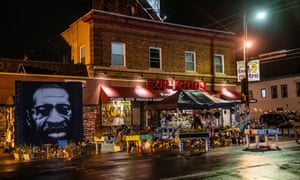The process of the trial for the killing of George Floyd will start with jury selection. It could be a lengthy process, writes Amy Forliti of the Associated Press. Twelve Hennepin County residents will be picked after an extensive grilling about their views on police and the justice system.
Derek Chauvin is charged with second-degree murder and manslaughter in Floyd’s death. Picking a jury is expected to take at least three weeks, as prosecutors and defense attorneys try to weed out people who may be biased against them.
“You don’t want jurors who are completely blank slates, because that would mean they’re not in tune at all with the world,” Susan Gaertner, a former prosecutor, said. “But what you want is jurors who can set aside opinions that have formed prior to walking into the courtroom and give both sides a fair hearing.”
Floyd was killed last year after Chauvin, who is white, pressed his knee against Floyd’s neck for about nine minutes. His death sparked Black Lives Matter protests in Minneapolis and beyond, and led to a nationwide reckoning on race. Chauvin and three other officers were fired; the others face an August trial on aiding and abetting charges.

Chauvin’s attorney, Eric Nelson, argued that pretrial publicity of the case and the subsequent violent unrest in Minneapolis would make it impossible to find an impartial jury in Hennepin County. But Judge Peter Cahill said last year that moving the trial probably wouldn’t cure the problem of a potentially tainted jury pool because “no corner of the State of Minnesota” has been shielded from pretrial publicity.
The potential jurors were sent questionnaires to determine how much they have heard about the case and whether they’ve formed any opinions. Besides biographical and demographic information, jurors were asked about prior contacts with police, whether they have protested against police brutality and whether they believe the justice system is fair. Some of the questions get very specific, such as how often a potential juror has watched the bystander video of Floyd’s arrest, or whether they carried a sign at a protest and what that sign said.
Unlike typical jury selection proceedings, this jury pool will be questioned one by one instead of in a group. The judge, defense attorney and prosecutors will all get to ask questions. The defense can object to up to 15 potential jurors without giving a reason; prosecutors can block up to nine with no reason given. Both sides can also argue to dismiss an unlimited number of jurors “for cause,” meaning they must provide a reason why they believe that juror shouldn’t serve.
Even if a juror says they have had a negative interaction with the police, or a negative opinion about Black Lives Matter, the key will be trying to find out whether they can put those past experiences or opinions aside and be fair.
Opening arguments are not expected until 29 March at the earliest.








